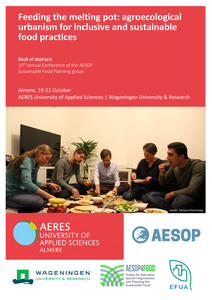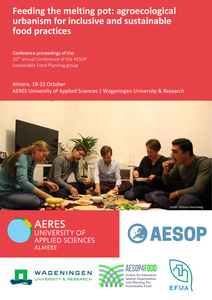This article discusses the question: where to with sustainable urbanism? It includes a historic review of the concept of sustainable urbanism and reviews of recent literature in the field of eco-cities. Through these reviews, it deliberately interrogates new pathways for sustainable urbanism. The result of this investigation is the insight that there are six design principles that are required to create a sustainable city: a design in which cycles are closed, redundancy is built in, anti-fragility is created, citizens are seen as (design) experts, the landscape is used as the basis, and innovative, rule-breaking designs are developed. These six design principles are then captured in three comprehensive concepts, which together support the design of a sustainable city: the design approach needs to be a (1) society-based; (2) complexity-led, and (3) landscape-driven design approach.
DOCUMENT
This book contains the abstracts to the sessions presented at the AESOP Sustainable Food Planning conference in 2022. The conference was made up of four tracks: social inclusion; urban agriculture; urban planning, design and development; food governance.
DOCUMENT

These conference proceedings to the 10th annual conference of the AESOP Sustainable Food Planning group are organised as follows: the following four sections contain the short papers belonging to the four tracks that made up the conference (social inclusion; urban agriculture; urban planning, design and development; food governance). The last section consists of the abstracts of the book and poster presentations, a short report on the YAP workshop held at the first day of the conference, and a short report on the excursion organised at the last conference day.
DOCUMENT

In human-controlled environments and in cultivated landscapes, the plants accommodate social, cultural and economic needs. This article will focus on the use of plants for agriculture, urban planning, forestry, environmental education and indoor decoration in The Netherlands. This exploration, based on literature review and observations, reveals mostly anthropocentric, instrumental and unsustainable practices. In urban landscapes, plants are pushed to the margins, if not entirely eradicated. This article shows that the moral recognition of plants is an ethical imperative, which is also critically important in order to achieve environmental sustainability. In line with ecocentric ethics and in the interest of long-term sustainability, this article suggests an alternative, more ethical and sustainable ways of relating to plants in The Netherlands and beyond. This is an Accepted Manuscript of an article published by Taylor & Francis in "Journal of Urbanism: International Research on Placemaking and Urban Sustainability" on 10/11/18 available online: https://doi.org/10.1080/17549175.2018.1527780 LinkedIn: https://www.linkedin.com/in/helenkopnina/
MULTIFILE

The study of moral reasoning in relation to sustainable development is an emerging field within environmental education (EE) and education for sustainable development (ESD). The vignette method was used to evaluate the perception of the relationship between environmental and social issues in the Dutch upper elementary school children. This case study is placed within two broad areas of tension, namely between the need to address urgent environmental problems and to promote pluralistic democratic learning; and between the value of environment as an economic asset and deep ecology perspective. Results of this study indicate that the children are able to critically think about the moral dilemmas inherent in sustainable development and distinguish between different values in relation to environment. https://doi.org/10.1016/j.stueduc.2013.12.004 https://www.linkedin.com/in/helenkopnina/
MULTIFILE

This article analyses four of the most prominent city discourses and introduces the lens of urban vitalism as an overarching interdisciplinary concept of cities as places of transformation and change. We demonstrate the value of using urban vitalism as a lens to conceptualize and critically discuss different notions on smart, inclusive, resilient and sustainable just cities. Urban vitalism offers a process-based lens which enables us to understand cities as places of transformation and change, with people and other living beings at its core. The aim of the article is to explore how the lens of vitalism can help us understand and connect ongoing interdisciplinary academic debates about urban development and vice versa, and how these ongoing debates inform our understanding of urban vitalism.
DOCUMENT

In this chapter we move back in time, to when it was not an usance to base our city designs on the natural systems of water and ecology. By the end of the 1980s the dogma of separation of functions, and dividing the city in areas for working, living, leisure and traffic was slowly abandoned and especially the focus on the traffic system, more in particular the car, was leading to uproar. In this timeframe an alternative to apply the principles of nature in urban design was very new and, in the beginning, needed to be conquered on the traditionalists who would pertain using their old-school design standards. In this chapter the development story of Westerpark, and Heilaar-Steenakker is presented. This area in the western outskirts of the city of Breda, in the south of the Netherlands, was one of the first, maybe even the first to use knowledge about the water system, ecological typologies and nature as the basis for urban planning. This article starts with a description in sections two and three of the policy context at national level to illustrate the momentum of change from rationalism towards ecological planning. In section four the policy context in Breda in the early nineties is presented as the context within which the planning of Heilaar-Steenakker (Sect. 8.5) and Westerpark (Sect. 8.6) could be based in a strong sense of the natural processes of ecology and water that formed the landscape in history.
LINK
In recent years, it has become a commonplace to argue that cities should be the focus point of sustainable development. Various authors have presented a variety of arguments why cities should be the preferred target to foster sustainable development-focused innovation; - The average consumption of resources of urban dwellers is higher. - The population of cities is growing continuously, while rural populations stabilize. - Deteriorating living conditions and segregation in cities caused by processes of gentrification of traditional neighbourhoods that drive out lower income groups to the suburbs. - Cities are ‘concentrated’ emitters of pollutants and therefore solutions and re-use might be easier to implement. https://doi.org/10.3390/su11185013 LinkedIn: https://www.linkedin.com/in/karel-mulder-163aa96/
MULTIFILE

With the emergence of education for sustainable development (ESD), robust literature on ethics and ESD has emerged; however, ecocentric perspective developed within environmental ethics is marginalized in current ESDebate. The questions discussed in this article are as follows: Why is the distinction between anthropocentric and ecocentric view of environment salient to ESD? How can this distinction be operationalized and measured? Until now, little has been done to address complement quantitative studies of environmental attitudes by qualitative studies, exploring the sociocultural context in which ecocentric or anthropocentric attitudes are being formed. Neither of existing scales engaged with the interface between environmental ethics and sustainable development. This article will discuss ESD in the context of environmental ethics and present the results of the case study conducted with the Dutch Bachelor-level students. Results of qualitative evaluation of the scale measuring ecocentric and anthropocentric attitudes will be presented, and the new Ecocentric and Anthropocentric Attitudes toward the Sustainable Development (EAATSD) scale will be proposed.
DOCUMENT

Urban regions are confronted with huge sustainability challenges. Their future depends to a large extent on our ability to promote sustainable urban development. However, sustainability challenges in cities are inherently complex and need integrated, multidisciplinary solutions. This textbook on Smart Sustainable Cities responds to that challenge by capturing theories, methods and tools relevant for researching smart sustainable cities and developing solutions for sustainability challenges within cities. This book thereby serves the great need among students and practitioners to understand the multifaceted nature of Smart Sustainable Cities, to build upon acknowledged cross-disciplinary analytical and design approaches, and to learn how to apply such approaches. Each chapter presents a practical approach to urban sustainability, a relevant case study, and exercises and assignments for students to master the topic. Topics include: Smart Sustainable Cities: an introduction; Systemic Design Thinking; Probing the Future for Smart Sustainable Cities; Social Design of Smart Sustainable Cities; Urban Psychology of Smart Sustainable Cities; Behavioural Change for Smart Sustainable Cities; Healthy Urban Living; Towards Energy Neutral Neighbourhoods; Carbon Footprinting and Accounting; Circular Economy: material and value flows in the city; Promoting Sustainable Urban Mobility; Canvas Business Modelling; Big Data Analytics; Social Value Innovation: from concept to practice.
DOCUMENT